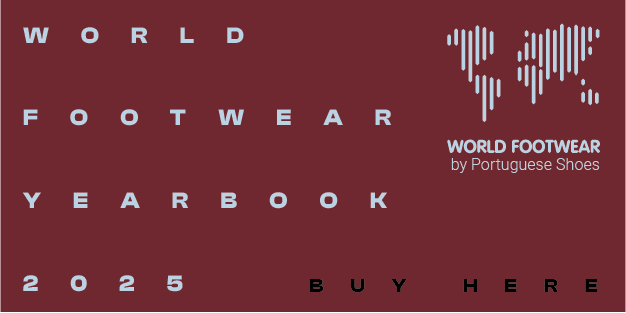New Generation: meet Pedro Sampaio

With a degree in business management training, Pedro Sampaio belongs to the second generation working at Mazoni, a footwear company based in Felgueiras, in the north of Portugal
Pedro Sampaio has been involved in Mazoni's management for over a decade now. Working along his dad, Mr. Sampaio considers the footwear sector most stimulating.
Why did you decide to work at Mazoni?
I made the decision of initiating my professional activity at Mazoni, firstly because this is a family business, founded by my father, thus with the consequent need of succession in order to keep growing and evolving, but most of all because this was a unique opportunity for me, as a young graduate in business management training.
Allied to these motivations, was also the fact that the footwear industry is closely related to fashion, trends, collections, designs and colors, characteristics which contrast with other industries that have somewhat a common routine. All of these circumstances make the footwear industry an extremely exciting work field.
In your view, what are the biggest challenges in the succession processes so common within the sector?
Although there are some complexities that are felt in some realities of successions in family businesses, as far as I’m concerned, up to now I haven’t felt major difficulties. The succession process in Mazoni is beeing done gradually and softly. Primarily, because my father (Fernando Sampaio) is still young and has a lot of energy and vitality to keep leading the company’s destiny for many years. His knowledge and experience, accumulated over decades working in this industry, are fundamental to face the daily challenges. Above all, there is also a harmonious and well-defined family structure that reflects itself on the business dynamics. Nowadays, a lot of the important decisions are shared, which allows the companies’ values and philosophies to live on and take part on projects and the company’s future.
In your opinion, what does the new generation of entrepreneurs has to offer to the sector?
The new generation of entrepreneurs has the ability to boost the sector at all levels. From the point of view of academic background, this is the generation that’s probably better prepared, which can mean that it has the necessary knowledge to respond to adversities, as well as recognize and seize the opportunities that the upcoming years may bring.
Nowadays, there a lot of challenges within the industry, ranging from the digitalization processes, to the increasing personalization of the product. Challenges that require strategic changes of business owners, both at commercial basis and productive/technical levels.
I believe the new generation has the required characteristics not only to continue the excellent work that was done by the previous generations on the development of our main competitive advantages, but also to continue to boost the Portuguese footwear from the qualitative, technological and design's points of view. The balanced approach of how we absorb all the knowledge of this successful generation and the implementation of ideas, technics and methodologies is perhaps the formula to keep demonstration the sector’s vitality in the future.
In what way do you believe it’s possible to evolve the footwear industry in the coming years?
In general, the Portuguese footwear industry has been investing in differentiating elements that makes it stand out from other countries. In my opinion, this sector’s will continue to evolve by increasingly focusing on the final consumer and the development of added-value products. Industry 4.0 will have a major role on the companies’ evolution. The technological advances and the connection to management systems will allow the companies to adapt their productive processes, enabling them to a greater product customization and customer proximity.
The emergence and development of brands and/or own label collections on the initiative of our companies will also allow the consolidation of the label “Made in Portugal” towards the goal of gaining a greater recognition and consequently increasing business opportunities.
Finally, the footwear industry must take vital steps to overcome the lack of workforce by taking action in attracting more people to work in this field, mainly youngsters, otherwise it may be strongly affected in the future.
Why did you decide to work at Mazoni?
I made the decision of initiating my professional activity at Mazoni, firstly because this is a family business, founded by my father, thus with the consequent need of succession in order to keep growing and evolving, but most of all because this was a unique opportunity for me, as a young graduate in business management training.
Allied to these motivations, was also the fact that the footwear industry is closely related to fashion, trends, collections, designs and colors, characteristics which contrast with other industries that have somewhat a common routine. All of these circumstances make the footwear industry an extremely exciting work field.
In your view, what are the biggest challenges in the succession processes so common within the sector?
Although there are some complexities that are felt in some realities of successions in family businesses, as far as I’m concerned, up to now I haven’t felt major difficulties. The succession process in Mazoni is beeing done gradually and softly. Primarily, because my father (Fernando Sampaio) is still young and has a lot of energy and vitality to keep leading the company’s destiny for many years. His knowledge and experience, accumulated over decades working in this industry, are fundamental to face the daily challenges. Above all, there is also a harmonious and well-defined family structure that reflects itself on the business dynamics. Nowadays, a lot of the important decisions are shared, which allows the companies’ values and philosophies to live on and take part on projects and the company’s future.
In your opinion, what does the new generation of entrepreneurs has to offer to the sector?
The new generation of entrepreneurs has the ability to boost the sector at all levels. From the point of view of academic background, this is the generation that’s probably better prepared, which can mean that it has the necessary knowledge to respond to adversities, as well as recognize and seize the opportunities that the upcoming years may bring.
Nowadays, there a lot of challenges within the industry, ranging from the digitalization processes, to the increasing personalization of the product. Challenges that require strategic changes of business owners, both at commercial basis and productive/technical levels.
I believe the new generation has the required characteristics not only to continue the excellent work that was done by the previous generations on the development of our main competitive advantages, but also to continue to boost the Portuguese footwear from the qualitative, technological and design's points of view. The balanced approach of how we absorb all the knowledge of this successful generation and the implementation of ideas, technics and methodologies is perhaps the formula to keep demonstration the sector’s vitality in the future.
In what way do you believe it’s possible to evolve the footwear industry in the coming years?
In general, the Portuguese footwear industry has been investing in differentiating elements that makes it stand out from other countries. In my opinion, this sector’s will continue to evolve by increasingly focusing on the final consumer and the development of added-value products. Industry 4.0 will have a major role on the companies’ evolution. The technological advances and the connection to management systems will allow the companies to adapt their productive processes, enabling them to a greater product customization and customer proximity.
The emergence and development of brands and/or own label collections on the initiative of our companies will also allow the consolidation of the label “Made in Portugal” towards the goal of gaining a greater recognition and consequently increasing business opportunities.
Finally, the footwear industry must take vital steps to overcome the lack of workforce by taking action in attracting more people to work in this field, mainly youngsters, otherwise it may be strongly affected in the future.
















